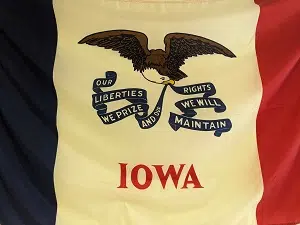(Des Moines) A bill to outlaw minors from being present at drag shows could have wider implications for access to art and transgender rights, opponents of the legislation said Tuesday.
The legislation, House Study Bill 158, moved out of an Iowa House subcommittee, where lawmakers said they expect changes to the bill. Under the current proposal, any adult person who knowingly brings a minor to a drag performance at a business can be charged with a class D felony. The owner or manager of an establishment who knowingly allows minors to attend drag shows could also be charged with a class D felony, and businesses could be fined $10,000 under the bill.
Many speakers advocating against the bill were against this premise — with many drag performers speaking about their experiences in age-appropriate drag shows. Other speakers said the bill’s definition of a “drag show” is far greater in scope than shows at LGBTQ pride events or those like “drag brunch” events.
The bill defines a drag show as a performance where “the main aspect of the performance is a performer who exhibits a gender identity that is different than the performer’s gender assigned at birth through the use of clothing, makeup, accessories, or other gender signifiers.” It also opens the definition of a performance to include singing, dancing, as well as reading or other performances “before an audience for entertainment.”
Maxwell Mowitz, representing the LGBTQ advocacy group One Iowa, said the broad language of the bill could mean that transgender people could be targeted under the law for public speeches or non-drag performances.
“First, what constitutes a performance?” Mowitz said. “I’m a transgender person. I was assigned female at birth, but I dress and live as a masculine person. So this bill targets me. This bill also defines performance as reading: Today, I’m reading testimony in front of a group of people, from the perspective of a trans person. … It seems to me that the language of this bill could be bent to make it illegal for a minor to attend an event in which I am speaking, including this very subcommittee, simply because I live ‘in drag,’ as a different gender than the sex that I was assigned at birth, which is drag according to this legislation.”
Mowitz also said the bill could prevent films like “Mrs. Doubtfire” or “Mulan” from being shown at public film screenings because it involves a person dressing as a gender different than that assigned at birth. Jim Obradovich, representing the Independent Venue Association of Iowa, said the legislation could also cut off access for children to works of classical art like Beethoven’s “Fidelio” and Shakespeare’s “Twelfth Night” because they contain characters who dress as another gender.
Obradovich also said small community theater productions could be impacted, as shows where actors are cast for a role that does not match their gender assigned at birth could be labeled as drag performances under the bill.
But advocates in support of the measure it was needed to protect children, arguing that drag shows were sexual performances. Danny Carroll with the Family Leader, a conservative Christian organization, said he supported free speech and the ability for drag performers to be at adult venues, but to “leave the kids alone.”
“It breaks my heart,” Carroll said. “This is not the Iowa that I knew when I came here in 1971 that we would be having such a discussion whether or not children should go to a drag show and be allowed inside.”
London Stanley, a drag performer who won the Teen Capital City Pride Pageant in 2024, said he has been performing drag since age 11 and has never experienced anything mentally and or physically harmful.
“As the current Miss Teen Capital City Pride I feel it is my duty to speak on behalf of Iowa’s teen drag community. This bill not only limits our constitutional right to freedom of speech, but also distracts from real issues affecting my home state and hometown of Marshalltown, such as homelessness, drug use, poverty and, more importantly, gun rights,” Stanley said.
Republican Reps. Helena Hayes and Heather Hora signed off on the bill with plans for an amendment. Rep. Elinor Levin, D-Iowa City, did not support moving it forward. Hayes, of New Sharon, said the bill’s language needs to be tightened, and that the bill was not intended to limit “perfectly acceptable” art performances. She disputed claims from some speakers that attempts to restrict minors’ access to drag performances was coming from a place of hatred for transgender people.
She said the measure was brought up because lawmakers have heard from parents and communities that feel drag performances are inappropriate for children.
“We are well aware that there are many concerns around drag shows,” Hayes said. “We hear about it quite often, from our constituents, from people across the state. The question is, are there drag performances, drag shows, that have obscene material, that have profanity, that have any inappropriateness for young children? That’s the question.”













